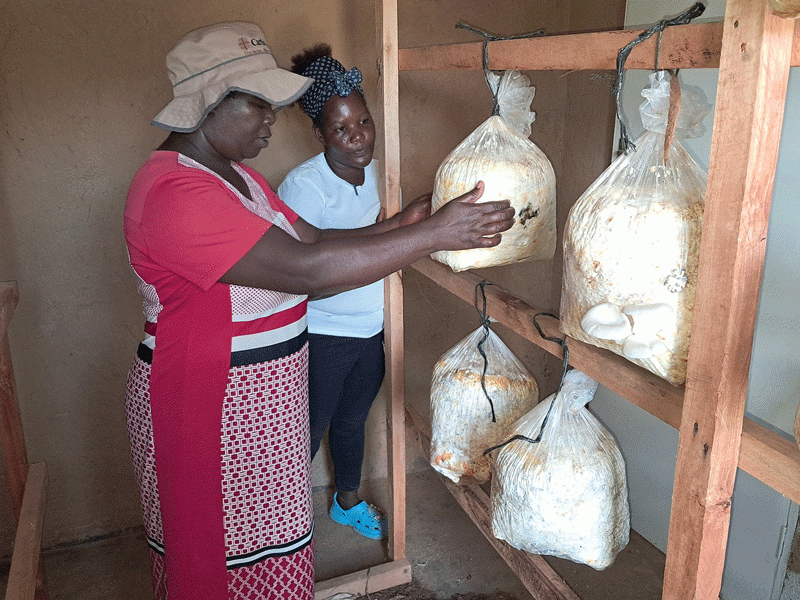
PERSEVERANCE Kaneta (19) exudes a certain level of confidence which defies her age when she speaks on climate change, its effects and mitigation efforts youths in her village have embarked on.
Kaneta, a member of Sunshine Community Garden in Mukondomi village, Chimanimani, speaks glowingly of how the group has become not only a source of knowledge on climate, but a sanctuary for productive youths intent on contributing to the development of their community.
On March 15, 2019, Chimanimani was hit by tropical Cyclone Idai, which saw heavy rains lashing the district situated about 500km east of Harare, leaving at least 400 people dead.
Approximately 18 000 people were left homeless while water, sanitation and hygiene infrastructure were damaged, with more than 50% of land under maize crop, banana plantation and tubers being washed away.

The cyclone also destroyed 18 irrigation schemes. Almost six years later, areas such Mukondomi are awakening from the disaster as knowledgeable people emerge who are ready to manage and mitigate climate change-linked challenges.
Sunshine Community Garden is part of the Green and Youth led Climate Action programmes being implemented in ward 21 of Chimanimani Rural District Council by the Green Governance Zimbabwe Trust (GGZT) under the Climate Justice Project funded by ActionAid Zimbabwe (AAZ). The project is popularly known as the Strategic Partnership Agreement 2.
In the project, GGZT established a youth movement of devoted young people, the Climate Action Team (CAT), who are championing climate education issues within their ward.
- Why are we still pitting jobs against public health?
- Jurgen Klopp: Liverpool manager signs new two-year contract extension at Anfield until 2026
- COP27: Zimbabwe’s opportunity to shine
- Shot in the arm for Chiredzi, Bikita communities
Keep Reading
In an interview recently, project co-ordinator Ronald Taruvinga said apart from climate education, the project beneficiaries were contributing meaningfully towards community resilience to climate change shocks.
“After sensing the mood of the day and facing the reality of failing climate sensitive livelihoods, the climate action teams ventured into alternative skills development ranging from detergent making, mushroom production and value addition of horticultural products.
“The mushroom initiative has contributed significantly towards household income and raised nutritional levels. Furthermore, the Climate Action Team, with support from GGZT and AAZ, established a garden, a demonstration and learning centre for agro-ecology.”
At the centre, the youths receive lessons on how to upscale agro-ecology principles as well as replicating the acquired skills at their individual homes.
According to Kaneta, the project, which she joined as a teen mother in 2022, has enlightened her on different issues, including child marriages which are rampant in the district.
“We have also been empowered with knowledge on how the use of clean energy can help our villages in protecting our natural resources including trees. The project also keeps youths from engaging in drug and substance abuse,” she said.
“We do demo gardens. What I have learnt here which I have shared with others in our community is the issue of gender-based violence, including using renewable energies, like solar energy, which reduces emission of carbon dioxide into the atmosphere.”
Farai Mafura (35) said some of their activities, including the recently introduced mushroom project, would sustain the project and wean members from donor funding.

“We also do gardening and it keeps us busy so that we do not engage in vices such as drug abuse,” he said.
“We have also seen cases of domestic violence decreasing with youths engaged in productive activities rather than spending time at shopping centres.”
Mafura applauded officials at the Chimanimani Rural District Council and traditional leaders who are supporting their activities.
“I can safely say our programmes have received overwhelming support from various stakeholders including council, traditional leaders and development partners who have made our activities fruitful,” he said.
Chairperson of the youth centre, which has 35 members, Sekai Chimero, said educating each other about climate change was important for Zimbabwean communities.
“We teach each other as young people to plant indigenous trees so that we can adapt to climate change,” she said.
“We are also teaching villagers about clean energy promoting the use of Jeka stoves, which are playing a huge part in pushing our efforts towards the adoption of green energy in our communities.”
Meanwhile, Taruvinga said the Jeka stoves had been well received in the communities as the programme sought to empower the villagers towards addressing household energy needs.
“Electricity in rural areas is confined to growth points and the main source of household energy is fuel wood. In a world where climate is ever changing, it has become difficult for communities to rely on fuel wood as deforestation is greatly discouraged,” he said.

“One of the ways of taking climate action is forest protection and CATs are a watchdog against deforestation. Models for household cooking have been introduced in the communities including the sawdust powered cooking stove and the Jeka stove.
“All these are efforts aimed at attaining efficiency in the use of firewood as well as adding value to sawdust. As of today CATs established a nursery with 700 indigenous trees with a target to reach 2 000 by December 2025. These trees will be used as an important asset on the national tree planting day.”
Taruvinga said there were plans to expand and diversify the activities in the ward.
“The youths will be getting solar dryers, branding and packaging materials as well as being introduced to other energy efficient alternatives towards attaining a just energy transition,” he said.
“All these efforts are directed towards increasing the adaptive capacity of young people to climate change shocks.”










